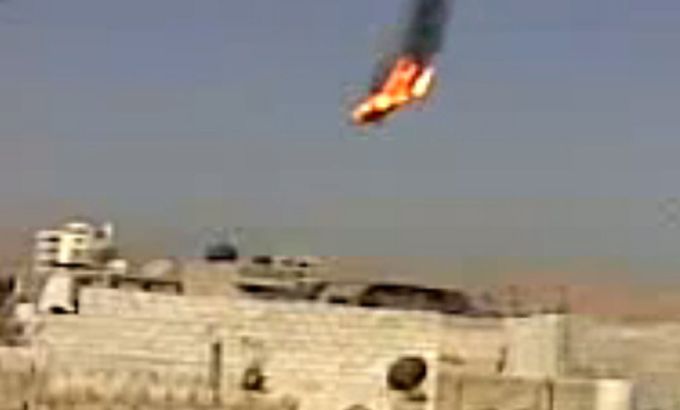Syria military helicopter crashes in Damascus
Rebels claim rare victory over government aircraft, saying they shot it down amid renewed fighting in capital.

A Syrian military helicopter has caught fire and crashed after it was apparently hit during fighting between government forces and rebels in the capital Damascus, an activist group has said.
Activists said the opposition Free Syria Army claimed that it had shot down the helicopter. Syria’s state-run media on Monday confirmed there had been a crash in Damascus, but it gave no further details.
Several videos posted on YouTube showed the helicopter flying above buildings while flames gradually engulf it as it abruptly turns, nose dives and spins towards the ground before disappearing from view.
State media said the helicopter crashed in al-Qaboun district, which is close to the western Damascus neighbourhood of Jobar.
Al Jazeera’s Rula Amin, reporting from Beirut in neighbouring Lebanon, said it was still unclear whether the aircraft was shot down or if it had merely crashed.
“But if this indeed was the work of the rebels it poses the question of how effective they have been in smuggling very significant weapons and advanced weapons to the capital Damascus,” she said.
“To bring it all the way to Damascus, hundreds of kilometres [away from rebel-held areas], is going to be a major breakthrough for the rebels and a major concern for the government if this is indeed the work of the rebels.”
The shooting down of the helicopter came as activists reported intense new fighting in the suburbs around Damascus, including a possible new massacre of more than 300 people in the Daraya district on Sunday.
Air attacks
Meanwhile, Syrian forces continued their air campaign against anti-government targets. Attacks by fighter jets killed at least 60 people in the eastern suburbs of Damascus, opposition groups said.
The suburbs of Zemalka and Saqba were targeted in the attacks, they said.
The Britain-based Syrian Observatory for Human Rights (SOHR), which initially reported Monday’s helicopter crash, said there was also fighting between troops backed by helicopter gunships and rebels in Jobar.
“Very fierce clashes [are] taking place between the rebels and government forces in so many districts around the capital and inside it and also in the southern part of the country, in Deraa province,” Al Jazeera’s Amin said.
|
Chris Bellamy analyses Damascus helicopter crash |
“We have seen an intensifying effort by the government forces to flush out the rebels from their strongholds, and the rebels have been hitting back wherever they could.”
With its forces stretched thin by fighting on multiple fronts, President Bashar al-Assad’s regime has been increasingly using helicopters and warplanes against the rebels.
The army has for more than a month been fighting major battles against rebels in Damascus and its suburbs while engaged in what appears to be a stalemate in the fight against rebels for control of northern Aleppo, the nation’s largest city and commercial capital.
The rebels are not known to have any answer to the regime’s air power except anti-aircraft guns that they mostly use as an anti-personnel weapon.
Last month, rebels said they had shot down a Russian-made MiG fighter, but the government blamed the crash on a technical malfunction.
Calls for investigation
Meanwhile on Monday, UN Secretary-General Ban Ki-moon was shocked by reports of the apparent massacre in Daraya and condemned it as “an appalling and brutal crime”, his spokesman Martin Nesirky said.
“This needs to be investigated immediately, in an independent and impartial fashion.
“Wherever there are atrocities, whoever is responsible needs to be held accountable and it underscores again the lack of protection for civilians that there is in Syria,” he said.
The SOHR said 320 bodies had been found and collected after what rebels said was a brutal onslaught of shelling, summary executions and house-to-house raids by government troops.
The group said another 14 bodies had been found on Sunday, and that it had so far identified 220 of the dead.
The Local Coordination Committees, a network of activists on the ground, described the killings as a “massacre” by Assad’s forces.
Activists have in the past used the word “massacre” to describe mass killings by regime troops targeting rebels who live and move among civilian populations.
‘Provisional’ government
Elsewhere on Monday, French President Francois Hollande called on Syria’s opposition to form a provisional government, saying “France will recognise the provisional government of Syria once it is formed”.
Hollande also took issue with Russian and Chinese reticence about reaching tougher language against Assad’s regime, saying “their attitude weakens our ability to carry out the mandate conferred on us by the UN charter”.
Speaking at a meeting of French diplomats, he also warned Assad that any use of Syria’s chemical weapons would be a legitimate justification for outside military intervention.
“With our partners we remain very vigilant regarding preventing the use of chemical weapons, which for the international community would be a legitimate reason for direct intervention.”
The Syrian conflict began 17 months ago with mostly peaceful protests demanding that Assad step down, but it has since morphed into a civil war. Rights activists say at least 20,000 people have so far been killed, and scores more have been displaced from violence-wracked areas.
Several thousand refugees have been halted on the Syrian side of the border with Turkey due to more stringent security checks in Turkey.
The tighter checks come amid Turkish fears that Kurdish rebels fighting for self-rule in southeast Turkey may be coming in through Syria.
There are also concerns that fundamentalist Muslim fighters from outside countries are moving in and out of Turkey to fight the Syrian regime.
On Monday, a government official said Turkey was providing emergency aid to the refugees while they waited to be processed.
Turkey hosts more than 80,000 Syrian refugees and has called on the United Nations to set up camps inside Syria.